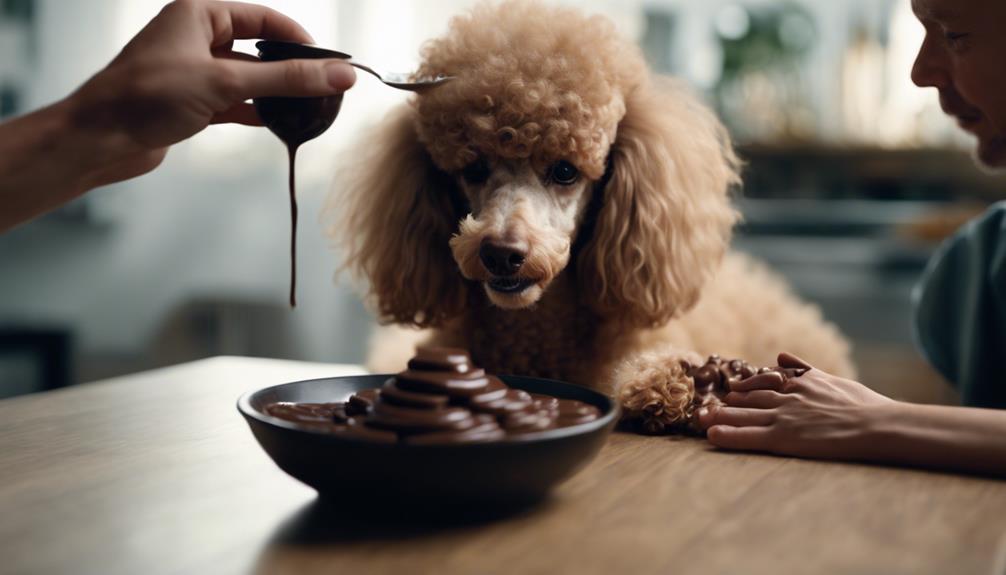When it comes to feeding your Poodle, you've probably heard the saying, "You are what you eat." And when it comes to their diet, making mistakes can have serious consequences. From portion sizes to food storage, there are key errors that can impact your Poodle's health and happiness. By avoiding these pitfalls, you can ensure your furry friend thrives. So, let's explore the crucial dos and don'ts of feeding your Poodle to keep them at their best.
Key Takeaways
- Monitor portion sizes to prevent obesity and health issues.
- Store food properly to maintain freshness and nutrition.
- Check expiration dates regularly to ensure food safety.
- Understand dental health and behavioral cues for optimal feeding.
Feeding Too Much or Too Little
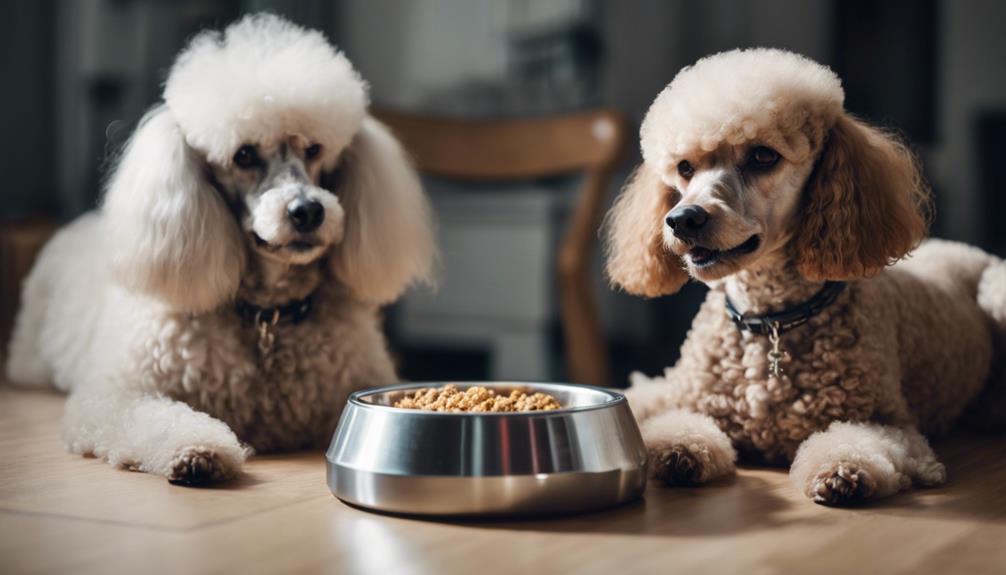
Avoid the detrimental effects of overfeeding or underfeeding your Poodle by carefully monitoring their portion sizes based on their individual needs. Proper feeding is essential for your Poodle's overall health. The amount of food they require is influenced by factors such as their size, age, and activity level. Overfeeding can lead to obesity, diabetes, and joint problems, while underfeeding may result in low energy levels, poor coat condition, and a weakened immune system.
To prevent these issues, consult with a veterinarian or utilize a dog food calculator to determine the appropriate portion sizes for your Poodle. Avoid making rough estimations to ensure they are neither overfed nor underfed. By feeding the correct amount of food tailored to your Poodle's specific requirements, you can help maintain their ideal weight, energy levels, and overall well-being. Remember, the key to a healthy and happy Poodle lies in providing them with the right balance of nutrition through proper feeding practices.
Incorrect Food Storage
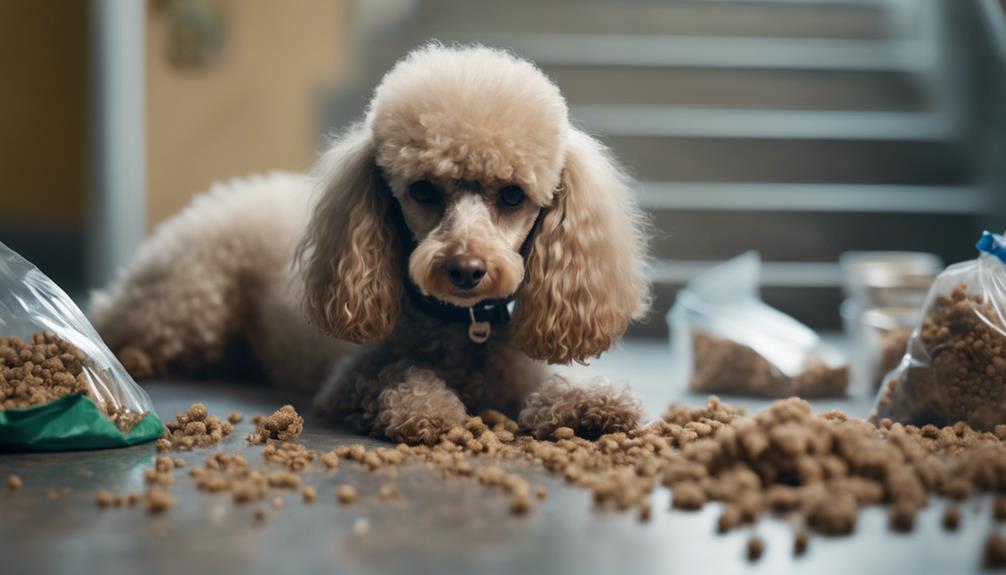
Improper food storage for your poodle can significantly impact the quality of their meals. Make sure to control the temperature of the storage area, choose the correct container, and always check expiration dates to ensure your poodle's food remains fresh and nutritious. Following these guidelines will help maintain the integrity of your poodle's food and keep them healthy and happy.
Improper Temperature Control
Storing your poodle's food at the correct temperature is crucial to prevent spoilage and maintain its nutritional quality. Improper temperature control can lead to dog food spoilage and bacterial growth. Here are some key points to consider:
- Avoid Warm or Humid Environments: These conditions can accelerate the expiration of dog food.
- Optimal Storage Temperature: Keep dog food between 50-70°F (10-21°C) for freshness.
- Sunlight Exposure: Store dog food away from direct sunlight to maintain its nutritional value and taste.
Incorrect Container Choice
Choosing the correct container for storing your poodle's food is essential to maintain its freshness and nutritional quality. Using improper containers, such as third-party bins or plastic containers, can lead to faster staleness or spoilage. Original dog food bags are specifically designed to provide freshness protection, so it's best to use them for storage. These bags help maintain the optimal nutritional content and quality of the food. By opting for the right storage container, you can prevent contamination and ensure your dog's food stays fresh for longer periods. Remember, the original packaging is key in preserving the freshness and quality of your poodle's food.
Neglecting Expiration Dates
To ensure the freshness and nutritional quality of your poodle's food, always prioritize checking the expiration dates on the dog food bags. Neglecting expiration dates can lead to feeding your poodle spoiled or nutrient-deficient food, which may harm their health. By paying attention to these dates, you can safeguard your furry friend from potential digestive issues and health problems. Remember that proper food storage is crucial; store dog food in a cool, dry place away from direct sunlight. Following these guidelines helps maintain the food's quality, prevents contamination, and ensures that your poodle's meals are safe for consumption.
- Check expiration dates on dog food bags regularly.
- Store dog food in a cool, dry place.
- Avoid feeding your poodle expired food.
Mixing New With Old Food
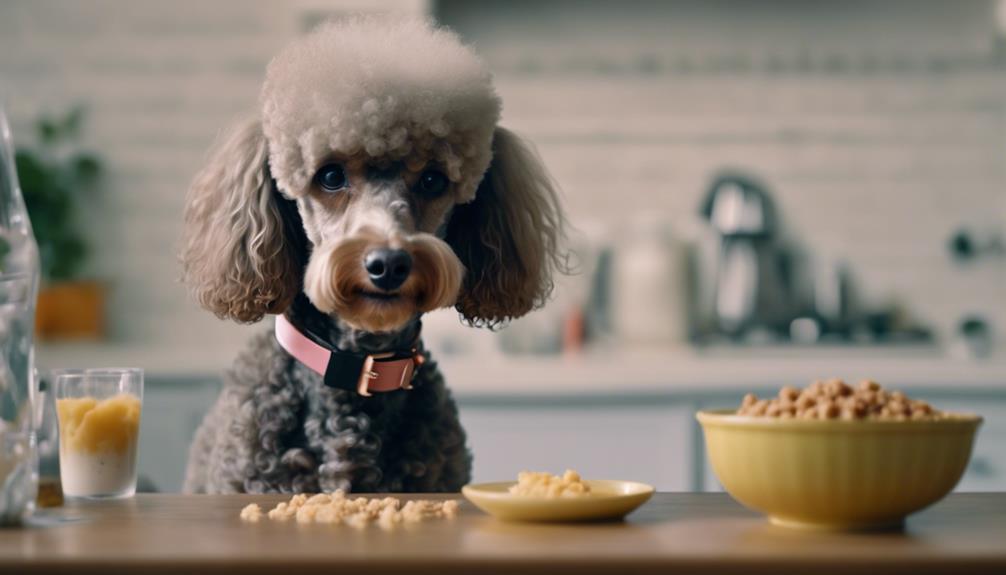
Mixing old and new dog food poses a risk of contamination and spoilage, potentially endangering your dog's health. When you combine different batches of dog food, you run the risk of bacteria transferring from the old food to the fresh one. This can lead to the growth of harmful pathogens that could make your dog sick. To prevent potential health risks, it's crucial to keep old and new food separate. Storing each bag of dog food separately helps maintain freshness and safety, ensuring that your dog's meals are free from contamination.
Leaving Food Out Constantly
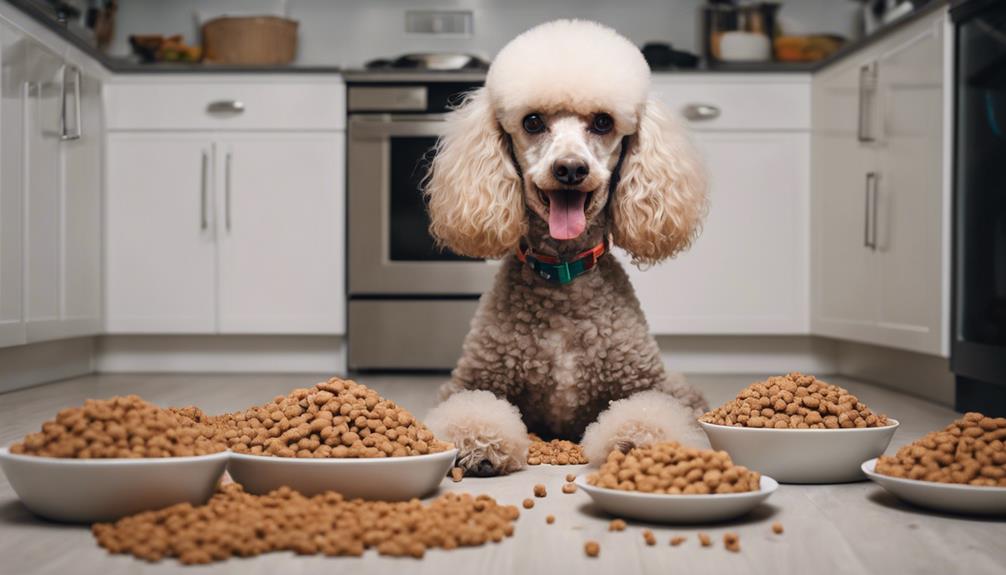
Leaving food out constantly for your Poodle can lead to various health risks and behavioral issues. Overfeeding is a significant concern when food is readily available all day. Here are some key points to consider:
- Overeating and Weight Gain: Constant access to food may encourage your Poodle to eat more than necessary, leading to obesity and related health issues.
- Disrupted Feeding Schedule: Your Poodle's feeding routine may become irregular if food is always accessible, making it challenging to establish a consistent schedule.
- Nutritional Imbalances: Overfeeding due to constant food availability can result in nutrient imbalances and digestive issues for your Poodle.
To avoid these problems, it's essential to establish a feeding schedule and portion control. By offering meals at set times and monitoring portion sizes, you can help your Poodle maintain a healthy weight and balanced diet.
Misunderstanding Food Costs
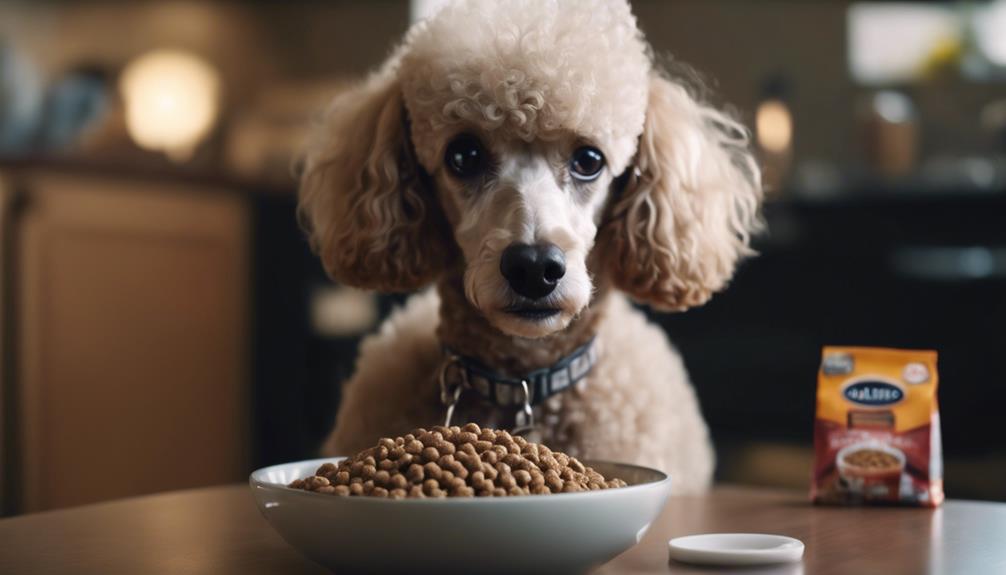
Understanding the actual expenses associated with your Poodle's food is crucial for making informed nutrition decisions. As dog owners, it's vital to consider more than just the upfront cost of a bag of dog food. High-quality dog food may seem pricier initially, but when you evaluate the cost per serving and the calorie density, you may find it to be more cost-effective in the long run. Different dog foods vary significantly in nutritional value and quality, impacting the overall cost you pay for your Poodle's nutrition.
When selecting your Poodle's food, look beyond the bag weight and consider the nutrients per serving. High-quality dog food often provides a more balanced and complete diet, which can lead to better health outcomes for your furry companion. By understanding the true cost of dog food and choosing wisely, you can ensure that your Poodle receives the necessary nutrients without overspending. Invest in your Poodle's health by making informed choices about their food.
Ignoring Poodle's Food Sensitivities
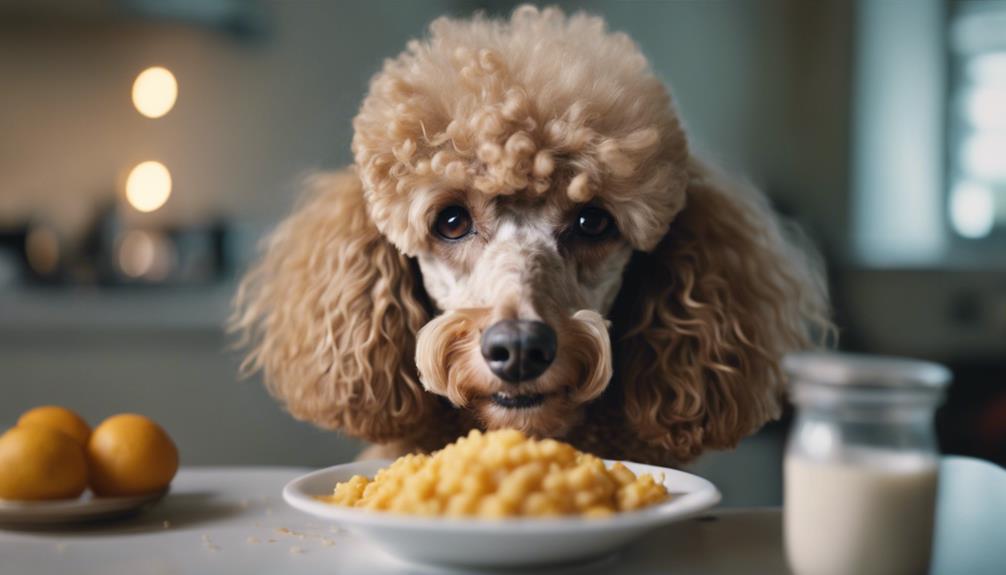
To maintain your Poodle's health and well-being, it is essential to promptly address any potential food sensitivities they may have. Ignoring these sensitivities can have detrimental effects on your Poodle's health, leading to digestive issues, skin problems, and overall discomfort. It is crucial to identify and avoid trigger ingredients that may cause adverse reactions in your furry companion. Some common trigger ingredients for Poodles include wheat, corn, and soy.
Key Points:
- Poodles can have food sensitivities to common ingredients like wheat, corn, and soy.
- Ignoring these sensitivities can lead to digestive issues, skin problems, and overall discomfort for the Poodle.
- Identifying and avoiding trigger ingredients is crucial for maintaining your Poodle's health and well-being.
Lack of Nutritional Balance
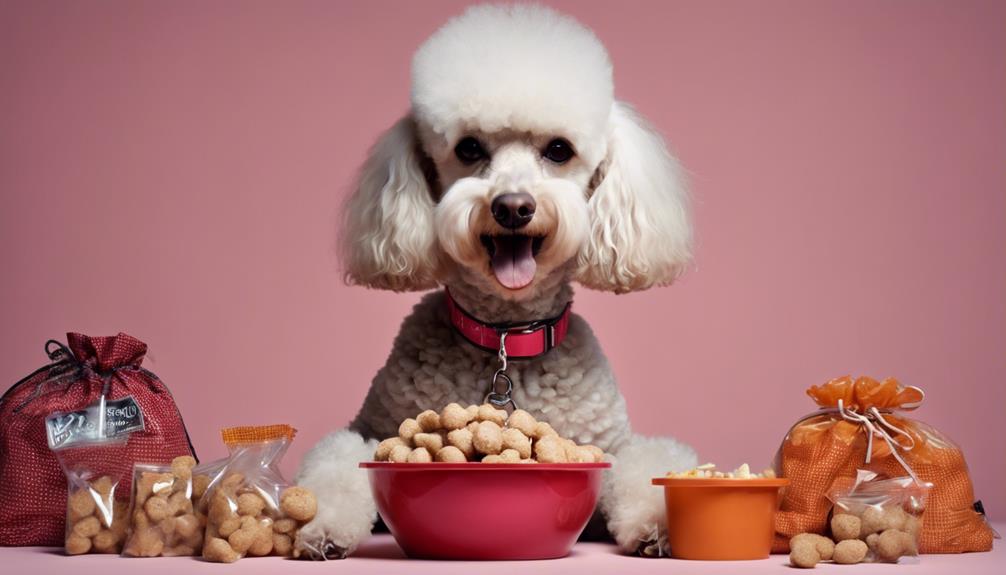
Addressing the nutritional balance in your Poodle's diet is crucial for ensuring their overall health and well-being. Dogs, including Poodles, require a balanced diet comprising protein, fats, carbohydrates, vitamins, and minerals to thrive. Neglecting this balance can lead to deficiencies and subsequent health issues in your furry companion. By providing the essential nutrients your Poodle needs, you can help prevent nutritional imbalances that may result in various health problems.
To ensure your Poodle receives all the necessary components for optimal health, consult with a veterinarian or pet nutritionist. These professionals can assist in creating a well-rounded diet plan tailored to meet your Poodle's specific nutritional requirements. Proper nutritional balance is key in supporting your Poodle's overall well-being, vitality, and longevity. Take the necessary steps to provide a diet that promotes health and happiness for your beloved pet.
Overlooking Hydration Needs
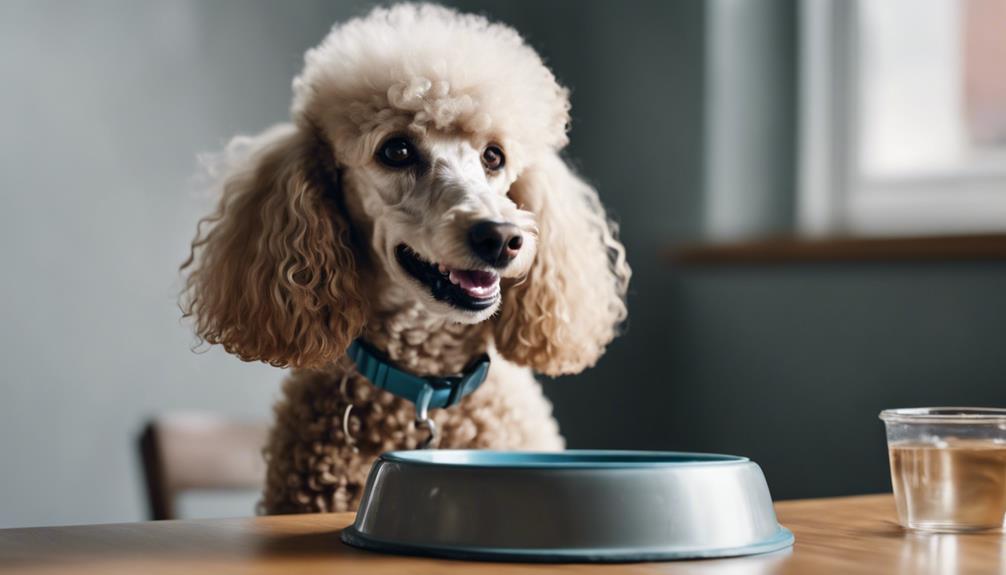
Ensuring your Poodle has constant access to fresh water is crucial for maintaining their hydration levels and overall health. Hydration plays a vital role in dog nutrition and overall well-being. Here are some essential points to consider regarding your Poodle's hydration needs:
- Water Consumption: Poodles should drink approximately 1 ounce of water per pound of body weight daily to stay adequately hydrated.
- Health Implications: Dehydration can lead to serious health issues in Poodles, affecting their digestion, nutrient absorption, and body temperature regulation.
- Symptoms of Dehydration: Ignoring hydration needs can result in lethargy, urinary tract problems, and other health complications in Poodles. It is essential to monitor your dog for signs of dehydration and ensure they have access to fresh water throughout the day.
Inconsistency in Feeding Schedule
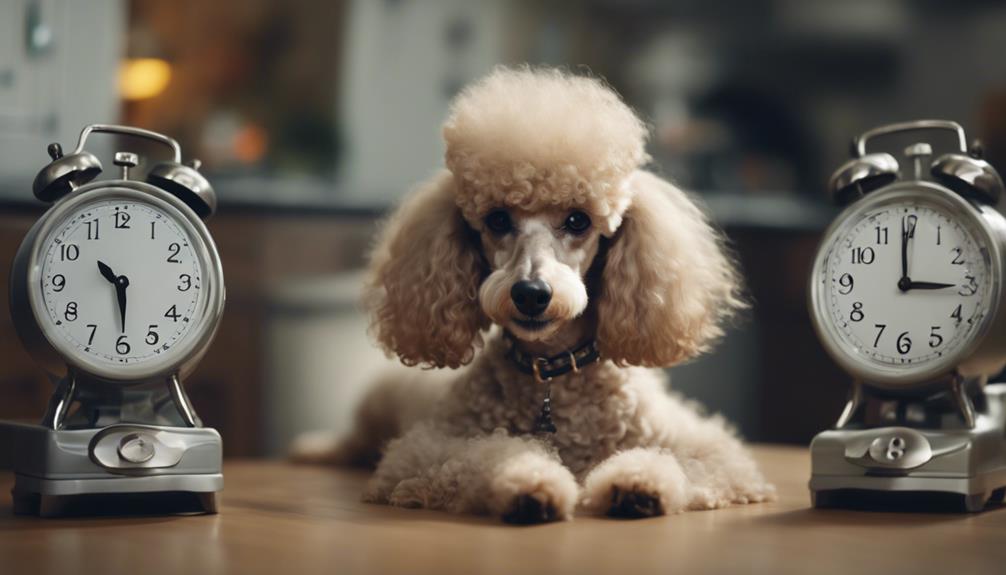
Maintaining a consistent feeding schedule for your Poodle is crucial to prevent digestive issues and promote overall well-being. Poodles, like many dogs, thrive on routine, making irregular meal times a common source of stress and anxiety. Changing feeding times frequently can disrupt your Poodle's eating habits and appetite, potentially leading to picky eating behaviors. Without a steady schedule, your dog's metabolism and digestion may be negatively impacted. Establishing a regular feeding routine is essential for your Poodle's health and well-being. By sticking to set meal times, you can help your dog feel secure and content, reducing the likelihood of digestive problems. Consistency in feeding not only supports your Poodle's physical health but also contributes to their mental and emotional stability. Remember, a predictable feeding schedule is a simple yet effective way to show your Poodle you care for their needs.
Using Incorrect Food Bowls
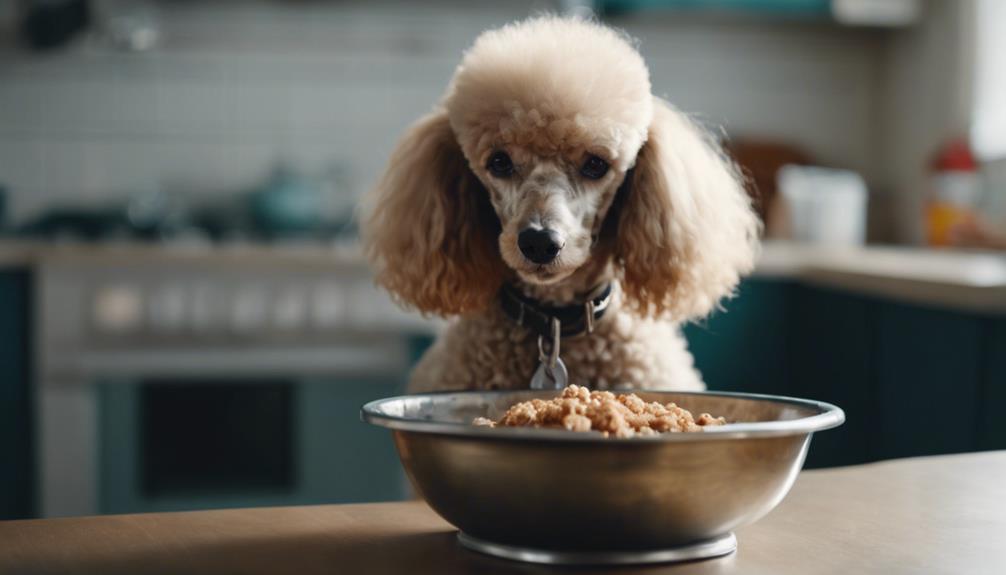
When choosing food bowls for your Poodle, consider using stainless steel options to prevent allergic reactions. Plastic bowls can harbor bacteria, potentially causing skin issues like chin acne. Opt for elevated or shallow bowls based on your Poodle's needs to promote healthy eating habits and prevent health complications.
Bowl Material Matters
Opting for stainless steel bowls over plastic ones is crucial for safeguarding your Poodle's skin health and preventing potential allergic reactions. Plastic bowls can harbor bacteria, leading to chin acne in Poodles and possible contact dermatitis, causing skin irritation. Stainless steel bowls are not only easier to clean, reducing the risk of bacterial growth, but they also provide a safer option for your furry friend. Choosing the right bowl material can significantly impact your Poodle's overall well-being and comfort during meal times.
- Stainless steel bowls prevent allergic reactions
- Plastic bowls can lead to chin acne
- Choosing the right bowl material is essential for your Poodle's skin health
Size and Shape
Choosing the appropriate size and shape of food bowls for your Poodle is crucial to prevent potential ear infections and discomfort during meal times. Poodles' long ears can easily dip into wide food bowls, leading to ear infections. It's best to opt for shallow, wide dog bowls that prevent ear contact with food. Remember that deep bowls may cause discomfort for Poodles due to their sensitive ears. Consider using stainless steel bowls for easy cleaning and durability. Additionally, select bowl sizes that match your Poodle's face shape to facilitate comfortable eating. By choosing the right dog bowls that consider your Poodle's ear health and comfort, you can ensure enjoyable meal times without the risk of ear infections.
Not Consulting a Vet for Diet
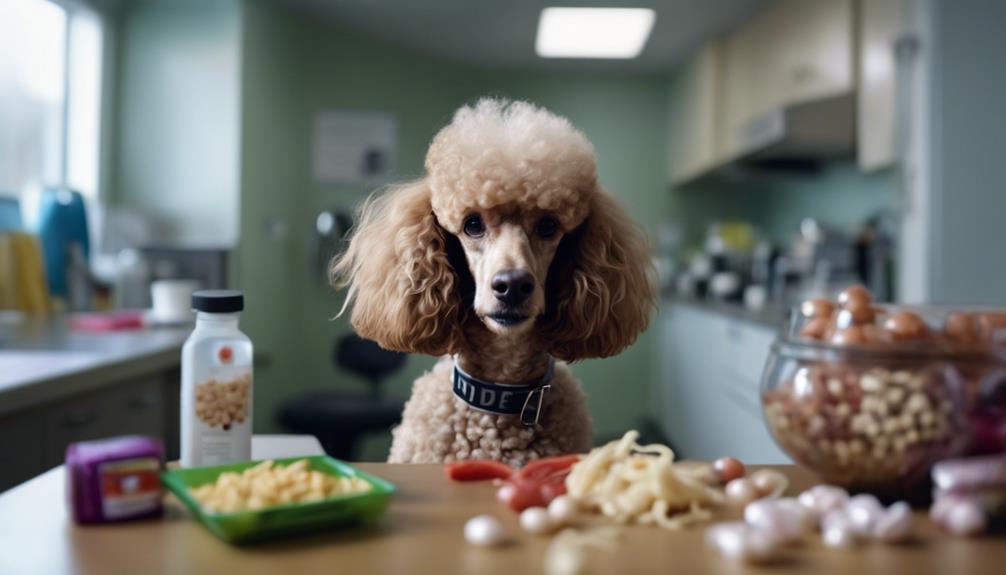
Are you ensuring that your Poodle's diet is tailored to their specific needs by consulting a vet for personalized advice? Consulting a vet for dietary guidance is crucial in ensuring your Poodle's overall health and well-being. Here are some reasons why consulting a vet is essential:
- Personalized Advice: Vets can provide personalized advice on your Poodle's specific dietary needs and health concerns.
- Identifying Health Conditions: Consulting a vet can help identify any underlying health conditions that may affect your Poodle's diet.
- Recommendations for Food Options: Vets can recommend suitable food options based on your Poodle's age, activity level, and any medical issues.
Professional guidance from a vet ensures that your Poodle's diet is well-balanced, meets their nutritional requirements, and addresses any specific health issues they may have. Regular check-ups with a vet can help monitor your Poodle's overall health and make necessary adjustments to their diet for optimal well-being.
Neglecting Dental Health in Diet
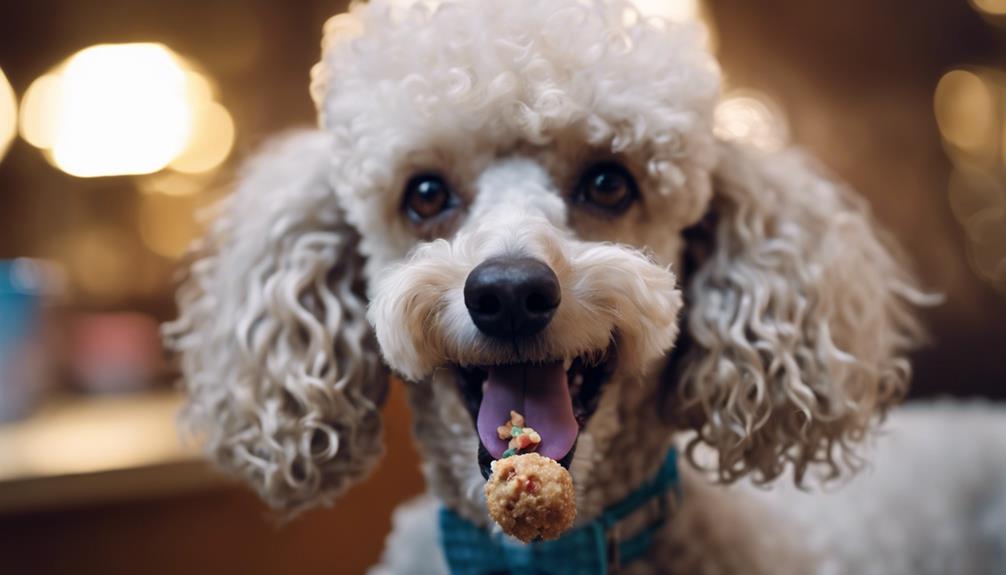
Neglecting your poodle's dental health in their diet can have serious consequences. Tartar buildup and oral issues can lead to pain, eating difficulties, and potential infections. Ensuring proper dental care, such as regular teeth brushing and including dental-friendly food choices, is crucial for your poodle's overall health and well-being.
Dental Treats Importance
Ensuring proper dental care through the inclusion of dental treats in your Poodle's diet is crucial for maintaining their oral health and overall well-being. Chewing on dental treats helps reduce plaque and tartar buildup on their teeth, preventing dental issues like gum disease and tooth decay. Additionally, regular use of dental treats promotes healthy gums and fresh breath in Poodles. Neglecting dental health in their diet can lead to costly dental procedures and discomfort for your furry companion. By incorporating dental treats into their routine, you can proactively support your Poodle's oral hygiene and prevent potential dental problems. Remember, a healthy mouth contributes to a happy and thriving pet!
Brushing Teeth Regularly
Proper dental care for your Poodle includes regular teeth brushing to prevent dental health issues and maintain oral hygiene. Neglecting dental care in your Poodle's diet can lead to serious problems like tooth decay, gum disease, and bad breath. Regular brushing helps prevent plaque buildup, reducing the risk of costly veterinary treatments and supporting your Poodle's overall health. Consider incorporating dental chews or toys designed for teeth cleaning to complement your Poodle's oral hygiene routine. Remember, responsible pet ownership includes prioritizing dental care as it significantly contributes to your Poodle's well-being.
| Importance of Brushing Teeth for Poodles |
|---|
| Prevents tooth decay and gum disease |
| Reduces bad breath |
| Maintains oral hygiene |
Dental-Friendly Food Choices
To promote dental health in your Poodle, opt for dry kibble as a dental-friendly food choice to reduce plaque buildup and encourage chewing for healthy gums and teeth. Dry food can help maintain oral hygiene by preventing food particles from sticking to teeth. Additionally, consider incorporating dental-friendly treats or toys to supplement your Poodle's oral care routine. Proper dental care through food choices is crucial in preventing periodontal disease in Poodles. Remember that while wet food is tasty, it may not be the best option for your Poodle's dental health. Choose dry food rich in protein and nutrients to support overall health and promote strong teeth and gums.
- Choose dry kibble for Poodles to promote dental health by reducing plaque buildup.
- Wet food can stick to teeth and lead to dental issues in Poodles.
- Dry food helps maintain healthy gums and teeth by encouraging chewing.
Ignoring Behavioral Cues at Mealtime
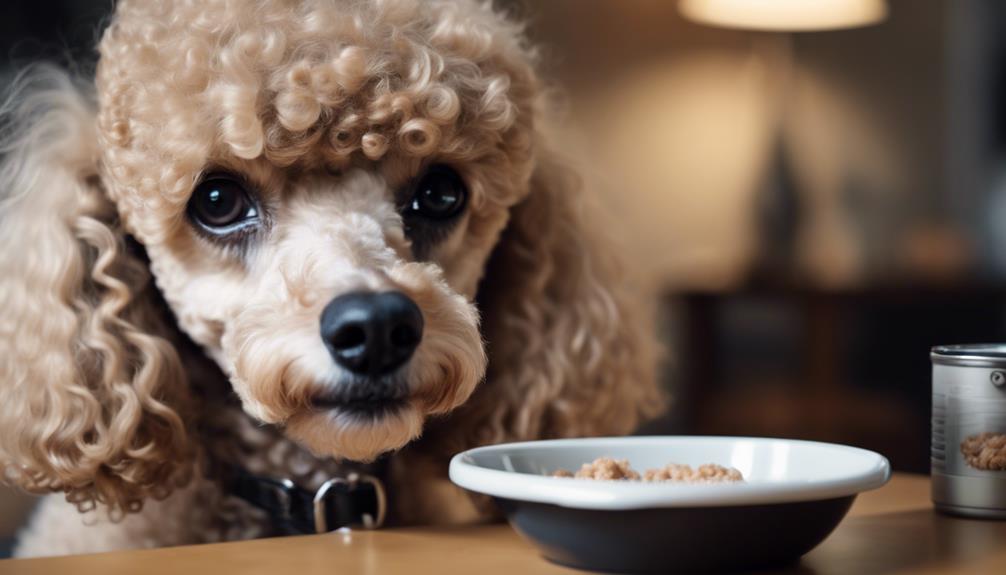
When feeding your Poodle, it is crucial to pay attention to their behavioral cues at mealtime. Ignoring behavioral cues like reluctance or disinterest during mealtime can indicate potential issues with the food or feeding schedule. Paying close attention to your Poodle's body language and reactions while eating is essential to understand their preferences and needs. Behavioral cues such as pushing the food around, walking away, or excessive sniffing can signal dissatisfaction with the meal, and addressing these promptly can help prevent feeding problems and ensure your Poodle is receiving adequate nutrition. By observing and responding to your Poodle's cues, you can establish a more enjoyable and successful feeding routine.
| Behavioral Cues | Interpretation |
|---|---|
| Reluctance to eat | Food might not be appealing or feeding time unsuitable |
| Pushing food around | Potential dislike of the food or seeking attention |
| Walking away | Indicates dissatisfaction or need for a break |
| Excessive sniffing | Could signal food aversion or curiosity |
| Excited and eager eating | Shows food preference and enjoyment |
Frequently Asked Questions
What Can Standard Poodles Not Eat?
Standard Poodles should avoid certain foods to stay healthy. Chocolate, grapes, onions, garlic, xylitol, and macadamia nuts are harmful. Protect your Poodle by steering clear of these items to prevent potential health issues.
What Food Do Poodles Like the Most?
You'll find Poodles often enjoy wet food for its texture and taste. Some may prefer high-quality, grain-free kibble. They might also like foods with added flavors like chicken or beef, and even those with fruits or veggies.
How Many Times a Day Should a Poodle Eat?
You should consider your Poodle's size, age, and activity level when determining the proper feeding schedule. Generally, Poodles benefit from 2-3 meals daily, with adjustments for puppies and free-feeding for those under 3 months. Tailor meals to promote optimal nutrition.
Should Poodles Eat Grain Free?
You should consider your Poodle's needs and consult a vet before deciding on a grain-free diet. Grain sensitivity is rare, and grains offer essential nutrients. Ensure nutritional balance and quality protein sources to keep your Poodle healthy.
Conclusion
In conclusion, avoiding poodle feeding mistakes is crucial for your pet's health and well-being. Whether it's ensuring proper portion sizes, storing food correctly, or consulting a vet for dietary advice, paying attention to these details is key. By being mindful of these factors and establishing a consistent feeding routine, you can help your Poodle live a healthy and happy life. Remember, a well-balanced diet is essential for your furry friend's overall well-being.
